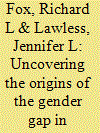| Srl | Item |
| 1 |
ID:
133934


|
|
|
|
|
| Publication |
2014.
|
| Summary/Abstract |
Gender quotas traditionally focus on the underrepresentation of women. Conceiving of quotas in this way perpetuates the status of men as the norm and women as the "other." Women are subject to heavy scrutiny of their qualifications and competence, whereas men's credentials go unchallenged. This article calls for a normative shift in the problem of overrepresentation, arguing that the quality of representation is negatively affected by having too large a group drawn from too narrow a talent pool. Curbing overrepresentation through ceiling quotas for men offers three core benefits. First, it promotes meritocracy by ensuring the proper scrutiny of politicians of both sexes. Second, it provides an impetus for improving the criteria used to select and evaluate politicians. Third, neutralizing the overly masculinized environment within parliaments might facilitate better substantive and symbolic representation of both men and women. All citizens would benefit from these measures to increase the quality of representation.
|
|
|
|
|
|
|
|
|
|
|
|
|
|
|
|
| 2 |
ID:
133933


|
|
|
|
|
| Publication |
2014.
|
| Summary/Abstract |
Based on survey responses from a national random sample of nearly 4,000 high school and college students, we uncover a dramatic gender gap in political ambition. This finding serves as striking evidence that the gap is present well before women and men enter the professions from which most candidates emerge. We then use political socialization-which we gauge through a myriad of socializing agents and early life experiences-as a lens through which to explain the individual-level differences we uncover. Our analysis reveals that parental encouragement, politicized educational and peer experiences, participation in competitive activities, and a sense of self-confidence propel young people's interest in running for office. But on each of these dimensions, women, particularly once they are in college, are at a disadvantage. By identifying when and why gender differences in interest in running for office materialize, we begin to uncover the origins of the gender gap in political ambition. Taken together, our results suggest that concerns about substantive and symbolic representation will likely persist.
|
|
|
|
|
|
|
|
|
|
|
|
|
|
|
|